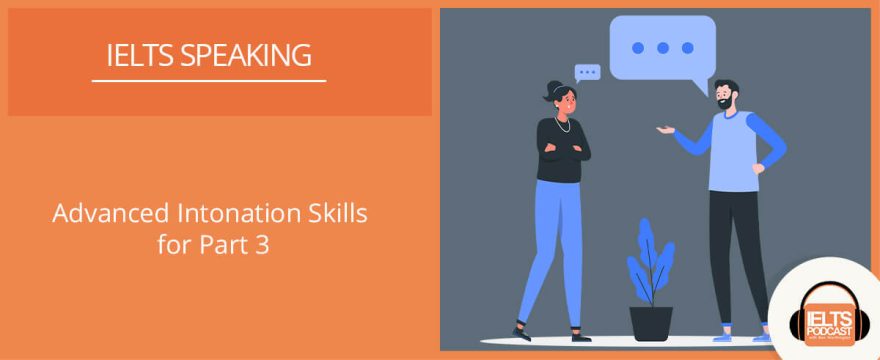In this tutorial, we discuss advanced intonation skills for IELTS Speaking Part 3.
Introduction
In IELTS Speaking Part 3, your intonation plays a crucial role in conveying meaning and showcasing your language proficiency. Proper intonation can enhance your spoken English and make your responses more engaging and persuasive.
In this article, we will explore why intonation is important, which parts of speech usually require intonation, how you can improve your intonation, and provide examples of using intonation when answering IELTS Part 3 questions.
We will also discuss what a poor answer might sound like and what a high-scoring answer would sound like, focusing on a neutral tone similar to that used in a job interview.
Why Intonation is Important
Intonation refers to the rise and fall of pitch in spoken language. It adds emphasis, conveys emotions, and helps differentiate between different sentence types. Using appropriate intonation can make your speech more engaging, expressive, and natural. It also helps the listener understand your intended meaning and follow your ideas more effectively.
Which Parts of Speech Usually Require Intonation
Certain parts of speech in the English language typically require intonation for effective communication. These include:
- Questions: When asking questions, your intonation should rise towards the end of the sentence to indicate it is a question. For example:
– Poor answer: “What is the capital city of France?” (flat intonation)
– High-scoring answer: “What is the capital city of France?” (rising intonation)
- Emphasis: Intonation can be used to emphasize specific words or phrases to highlight their importance or contrast. For example:
– Poor answer: “I prefer watching comedies.” (monotonous intonation)
– High-scoring answer: “I prefer watching comedies.” (emphasizing “prefer” and “comedies”)
- Contrast: Intonation can be used to show contrast between ideas or options. For example:
– Poor answer: “I like both hiking and swimming.” (flat intonation)
– High-scoring answer: “I like both hiking and swimming.” (rising intonation on “hiking” and “swimming” to indicate contrast)
How to Improve Your Intonation
Improving your intonation requires practice and awareness. Here are some tips to help you enhance your intonation skills:
- Listen to native speakers: Pay attention to the intonation patterns of native speakers in different contexts. Listen to podcasts, interviews, and conversations to develop a better understanding of natural intonation.
- Mimic and imitate: Practice imitating the intonation patterns of native speakers. Record yourself and compare your intonation with the original. Focus on pitch variation, rising and falling intonation, and stress on important words.
- Use intonation in everyday conversations: Apply what you learn in real-life conversations. Pay attention to the intonation of your own speech and consciously incorporate variations to make your communication more expressive.
Examples of Using Intonation in IELTS Part 3
Let’s consider an IELTS Part 3 question about technology and its impact on society:
Question: How has technology changed the way people communicate with each other?
Poor answer: “Technology has changed the way people communicate with each other.” (flat intonation throughout)
High-scoring answer: “Technology has changed the way people communicate with each other.” (rising intonation on “changed” and “communicate” to emphasize the impact).
In the high-scoring answer, the intonation variation helps convey the significance of the change and adds emphasis to the key points.
Conclusion
Mastering intonation is an advanced speaking skill that can greatly enhance your communication in IELTS Speaking Part 3. By using appropriate intonation, you can convey meaning, engage the listener, and demonstrate
Join many other students who have achieved IELTS success with our online IELTS course or get instant feedback with our online essay checker.
You can download or listen to the full tutorial here:
| Direct Download Here | Stitcher | Apple Podcasts | Spotify
Podcast: Play in new window | Download
Subscribe: RSS

